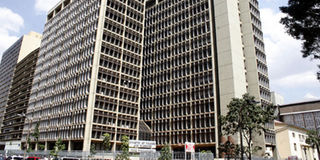Treasury ‘snubbed’ experts on budget

Parliament’s budget analysts have criticised the Treasury, the National Assembly and the Judiciary for ignoring advice on government spending. Photo/FILE
What you need to know:
- The Parliamentary Budget Office says it suspects most of the targets set by the Executive for the next financial year are “cut-and-paste” jobs from earlier spending plans and have no grounding in reality.
- In budget-making under the Constitution, Parliament has the power to not only determine its own budget but also to prescribe the maximum for other arms of government as long as it is reasonable.
Parliament’s budget analysts have criticised the Treasury, the National Assembly and the Judiciary for ignoring advice on government spending.
The Parliamentary Budget Office (PBO) has found a difference of Sh114 million between the budget summary and the itemised budget in the estimates presented to the National Assembly.
In a presentation to the Budget and Appropriations Committee, the PBO says it suspects most of the targets set by the Executive for the next financial year are “cut-and-paste” jobs from earlier spending plans and have no grounding in reality.
“It appears there is a variance of Sh114.58 million between the gross development expenditure for 2014/2015 as provided for in the budget summary and the itemised budget,” the PBO says in an analysis prepared for MPs.
While the Budget summary shows the government intends to spend Sh486.9 billion on development, the itemised budget shows a higher figure of Sh487.01 billion.
“The estimates vary significantly from the Budget Policy Statement (BPS) and the House resolutions, this shows that the National Treasury, Judiciary and Parliament did not adhere to the ceilings that were meant to guide the budget-making process,” the PBO says.
BUDGET CEILING
It adds that the total budget estimates for ministries and departments, Parliament and the Judiciary exceed the Sh1.1 trillion set in the BPS and the Sh1.3 trillion set by the committee and adopted by the House.
A budget ceiling is the maximum amount set by the Budget team that the respective departments or arms of government ought to be allocated in a financial year.
In budget-making under the Constitution, Parliament has the power to not only determine its own budget but also to prescribe the maximum for other arms of government as long as it is reasonable.
The committee had recommended that the Budget ceilings for the Judiciary be set at Sh17 billion and Sh25.7 billion for Parliament.
The Treasury has allocated Judiciary Sh14.7 billion and Parliament Sh25 billion.
The largest variations are in the allocations to Lands Ministry and the National Treasury, whose allocations are 39 per cent and 33 per cent higher than those recommended by the House.
By ignoring completely the resolutions of Parliament, Treasury, Parliament and the Judiciary will be seen to be undermining the power of the lawmakers.
DISCREPANCIES
“There has to be sanctions,” committee chairman Rev Mutava Musyimi muttered as the official from the PBO pointed out the discrepancies.
The largest variations are in the allocations to the Lands, Housing and the Urban Development ministry and the National Treasury, whose allocations are 39 per cent and 33 per cent higher than those recommended by the House.
On the other hand, the National Land Commission and the Gender and Equality’s allocations were slashed by 67 and 37 per cent respectively.
These are among the tough questions Treasury Cabinet Secretary Henry Rotich and the techocrats are likely to face when they meet the Budget team to explain the apparent discrepancies.
Treasury will also be asked to explain why the National Assembly’s resolutions on the Budget Policy Statement were ignored completely.
“There is clear evidence of poor planning as there exist disconnect between programs as presented in the BPS and those provided for in the estimates,” the PBO states.
Treasury also failed to include the sources of funding per program, which is contravention of the Public Finance Management Act.
Overall, says the PBO, the government’s strategies for the reduction of poverty appear not to have worked as poverty has increased from 40.9 per cent to approximately 52 per cent between 2005/2006 and 2012/2013.




